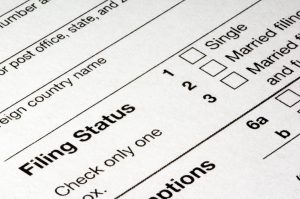Filing Taxes as a Married Couple
 If you were married this past year, congratulations!
If you were married this past year, congratulations!
Getting married is a big step in your life and along with it comes many changes. One change is filing taxes as a married couple for the first time. This advice can help you get started.
First, you must determine your filing status. Your status depends on your marital status on the last day of the year. If you were legally married as of December 31, you are considered to be married for the full year and must either file a Married Filing Joint or Married Filing Separate tax return. Filing status is important for determining your standard deduction, whether you qualify for various deductions and credits, and the amount of tax is owed.
Filing Alternatives
If you choose to file a Married Filing Joint tax return, you must include all your and your spouse’s income, deductions, and credits on one tax return. The standard deduction in 2018 for filing a Married Filing Joint tax return is $24,000. If you choose to file a Married Filing Separate tax return, each of you will report your respective income, deductions, and credits on separate tax returns.
The standard deduction for a Married Filing Separate tax return is $12,000 each. Married Filing Separate will rarely produce a lower tax liability. Most tax preparing software will provide you with an analysis on whether filing separately makes sense. If using a self-preparing software or if you work with a tax preparer, be sure to ask which way produces a lower liability for your family.
When filing a separate tax return, there are some tax deductions that may be unavailable to you:
- If you itemize your deductions, your spouse must also itemize their deductions. You may not mix and match the itemized deduction and the standard deduction.
- The Earned Income Credit is unavailable.
- The Child and Dependent Care Credit is generally unavailable.
- You cannot deduct interest paid on student loans.
- Adoption Credit is generally not allowed.
- Reduction of Child Tax Credit is unavailable.
Considerations for Working Couples
For couples who both work, both spouses will need to adjust the tax withholding from their paychecks. One of the biggest mistakes of newlywed couples and taxes is the under withholding of income tax from their paychecks. Because your income will be taxed together, this may push you into a higher tax bracket and when it’s time to file your tax return, there will be a surprise balance due. Be sure to sit down with your spouse and properly fill out each of your Form W-4s Employee’s Withholding Allowance Certificate correctly. Form W-4 worksheets are available to walk you through the process of matching tax due with withholdings. The goal here is to match these as close as possible so that there is not a large balance due or large refund. This way you have the most money in your pocket all year long.
Name and Address Changes
One other thing to keep in mind is filing with the correct names and addresses. If there are any name changes, be sure to use the correct name on your married tax returns. If there is an address change, you should change your address with the IRS by filing Form 8822 Change of Address and mailing it to the address on the form. You should also update your address with your local post office. If you have any children, be sure to include them as well on your tax return with their full name and social security number. Retirement accounts and beneficiary information should also be updated accordingly if your spouse is the beneficiary.
Considerations for Home Sales
Planning on selling your home? Your taxable gain exclusion on your personal residence doubles from $250,000 to $500,000 once you are married. This is only the case if you own the home and both you and your spouse have lived in the home the past 2 out of 5 years. If you sold your home before you were married, the $250,000 would still apply.
Keeping these tips in mind can help make your first tax season together go a bit more smoothly.
Lance Aligo, CPA, MSA, is a senior accountant at KRS CPAs, LLC, Paramus, NJ. You can reach him at laligo@krscpas.com or 201-655-7411. Check out KRSCPAS.com for more tax tips, checklists, blogs, and other resources to help you succeed.



